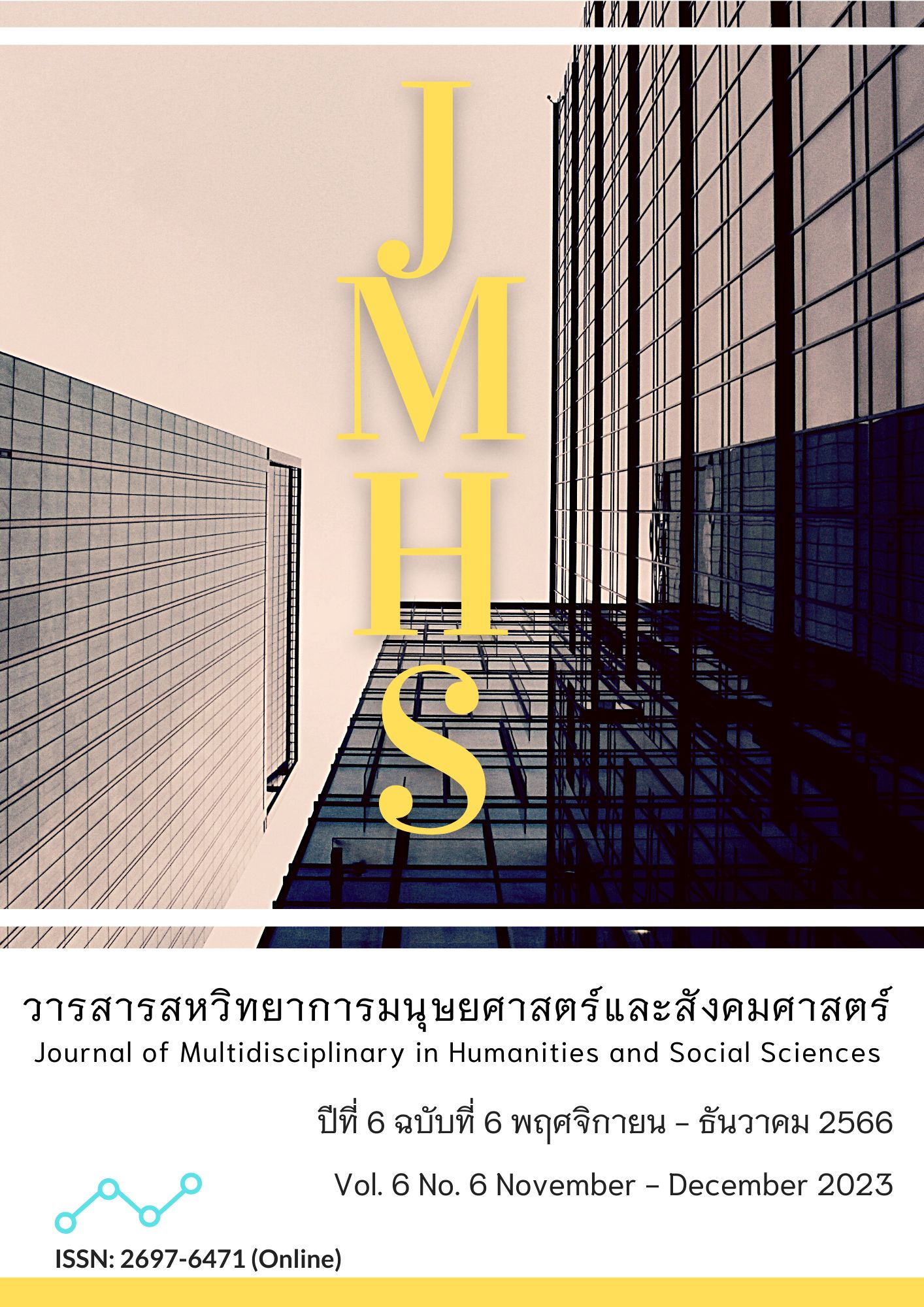Human Resource Development Activities under the OTOP School: Analyzed by OVOP Conceptual Framework
Main Article Content
Abstract
The objective of this research was to examine the limitations and obstacles as well as the factors that contribute to human resource development under the various activities of the OTOP school project. It was qualitative research with in-depth interviews. The results of the research showed that the courses from the central curriculum of the Community Development Department, Ministry of Interior, have content focused on product development as well as being too short in teaching time. This was a constraint and an obstacle to human resource development. Instead, knowledge enhancement activities were mainly devoted to supporting human resource development. Knowledge enhancement activities were organized by OTOP schools by the OTOP school leaders, who are people within the local community; or in other words, people within the community understand the problems of human resource development within the community better than people outside the community. As such, people in the community must play a key role in the development of their local community.
Article Details

This work is licensed under a Creative Commons Attribution-NonCommercial-NoDerivatives 4.0 International License.
Views and opinions appearing in the Journal it is the responsibility of the author of the article, and does not constitute the view and responsibility of the editorial team.
References
Aimsa-ard, A. (2022). OTOP Nawat-withi Baan Roum Thai, Kui Buri District, Prachuap Khiri Khan Province. Interview, 19 February.
Aksonkul, S. (2022). Deputy Director General of Community Development Department, Ministry of the Interior. Interview, 4 June.
Anh Thu, N. T. (2013). One Village One Product (OVOP) in Japan to One Tambon One Product (OTOP) in Thailand: Lessons for Grass Root Development in Developing Countries. Journal of Social and Development Sciences, 12(4), 529-537.
Bho-yod, B. (2022). Bann Pongkanaeng Woven Fabric Group, Banphot Phisai District, Nakorn Sawan Province. Interview, 29 January.
Bhu-Thamin, R. (2022). OTOP Nawat-withi Baan Salak-Kok, Koh Chang District, Trat Province. Interview, 15 May.
Boonchan, S. (2022). OTOP Bann-saket, Koh Samui District, Suratthani Province. Interview, 13 March.
Boonroun, P. (2022). Committee of Bho-thong Vocational College and Director of OTOP School Ang Thong Province (Bang-chaocha’ Basketry Group). Interview, 6 August.
Boonsathid, N. (2022). Director of OTOP School Chiangmai Province (OTOP Sankamphaeng Group). Interview, 9 April.
Chakhatrakarn, S. (2022). Associate Professor, Dr., Former Vice Rector of Thammasat University and Former President of Thai Student Association under the Royal Patronage at Japan. Interview, 1 June.
Chantip, S. (2022). Community Development Office, Lampang Province. Interview, 12 April.
Claymone, Y., & Jaiborisudhi, W. (2019). An Analysis of One Tambon One Product (OTOP) Project: Problems, Obstacles, Achievements. International Journal of East Asian Studies, 23(2), 172-192.
Community Development Department, Ministry of the Interior. (2018). OTOP Nawat-withi Handout. Bangkok: Community Development Department, Ministry of the Interior.
Community Development Department, Ministry of the Interior. (2018). OTOP School Course Syllabus. Bangkok: Community Development Department, Ministry of the Interior.
Denpaiboon, C., & Amatasawatdee, K. (2012). Similarity and Difference of One Village One Product (OVOP) for Rural Development Strategy in Japan and Thailand. Japanese Studies Journal. Special Issue: Regional Cooperation for Sustainable Future in Asia, (2), 52-62.
Hiramatsu, M. (2008). One Village, One Product Spreading throughout the World. Oita: OVOP International Exchange Promotion Committee.
Kasornbua, T. (2022). Assistant Professor Dr., Faculty of Business Administration and Service Industry, King Mongkut’s University of Technology North. Interview, 19 August.
Kemavuthanon, S. (2014). Leadership in the OVOP and Similar Movements: The Comparative Study between the OVOP Movement in Japan and OTOP Project in Thailand. International Journal of Public Administration, 37(9), 542-555.
Kitipadung, J., & Jaiborisudhi, W. (2021). Problems and Recommendations Regarding Human Resource Development within the OTOP Project: A Case Study of Herbal Cosmetics Entrepreneurs. Humanities, Arts and Social Sciences Studies, 21(2), 263-270.
Kunpluem, P. (2022). Assistant Professor Dr., School of Business Administration, Sripatum University. Interview, 9 June.
Kurokawa, K., Tembo, F., & te Velde, D.W. (2010). Challenges for the OVOP movement in Sub-Saharan Africa: insights from Malawi, Japan and Thailand. London: Overseas Development Institute.
Lo-mang, R. (2022). Community Development Office, Koh Samui District, Suratthani Province. Interview, 11 March.
Lomaphan, K. (2022). Community Development Office, Saraburi Province. Interview, 10 June.
Ma-thong, N. (2022). OTOP School Kon Kaen (Koomsukko Handicraft Group). Interview, 4 March.
Na-thongho, M. (2022). Community Development Office, Kon Kaen Province. Interview, 6 March.
Natsuda, K., Igusa, K., Wiboonpongse, A., & Thoburn, J. (2012). One Village One Product–rural development strategy in Asia: the case of OTOP in Thailand. Canadian Journal of Development Studies, 33(3), 369-385.
Nobuyoshi, N., & Lutful, K. (2005). One Village One Product Movement: Success Story of Rural Development in Japan and Learning Points for Bangladesh. The Economic science, 52(4), 71-92.
Office of Local Wisdom Promotion and Community Enterprise, Department of Community Development, Ministry of the Interior. (2020). OTOP’s Database. Bangkok: Office of Local Wisdom Promotion and Community Enterprise, Department of Community Development, Ministry of the Interior.
Or-Por-Tor News. (2023, March 16-31). OTOP Sales of 2.4 Billion-Baht in 2022. Or-Por-Tor News, 1.
Petcharat, A. (2022). Director of Office of Local Wisdom Promotion and Community Enterprise, Department of Community Development, Ministry of the Interior. Interview, 20 July.
Shakya, G. (2011). Understanding One village One Product in Japan, Thailand and Nepal. Kathmandu: JICA Nepal Office.
Trisang, S. (2022). Lecturer, Dr. Faculty of Management Sciences, Phranakorn Sri Ayutthaya Rajabhat University. Interview, 16 August.
Yamagami, S., & Fujimoto, T. (2012). The Prototype for the One Village One Product Movement: Community Development Initiatives in Oyama Town. The OVOP Movement and Local Development in Asia-How to Nurture Rural Entrepreneurs in the Developing World, Igusa, K. (eds.). Oita: Ritsumeikan Asia Pacific University.
Yampochai, K. (2022). Assistant Professor Dr., Faculty of Social Science Kasetsart University. Interview, 18 August.


